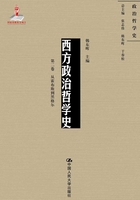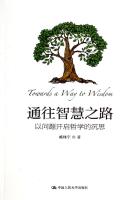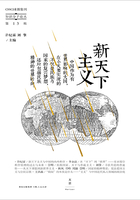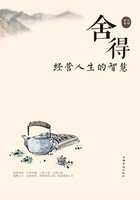This reflection also tends to the removal of the desire of empty fame,that it is no longer in thy power to have lived the whole of thy life,or at least thy life from thy youth upwards,like a philosopher;but both to many others and to thyself it is plain that thou art far from philosophy.Thou hast fallen into disorder then,so that it is no longer easy for thee to get the reputation of a philosopher;and thy plan of life also opposes it.If then thou hast truly seen where the matter lies,throw away the thought,How thou shalt seem to others,and be content if thou shalt live the rest of thy life in such wise as thy nature wills.Observe then what it wills,and let nothing else distract thee;for thou hast had experience of many wanderings without having found happiness anywhere,not in syllogisms,nor in wealth,nor in reputation,nor in enjoyment,nor anywhere.Where is it then? In doing what man's nature requires.How then shall a man do this? If he has principles from which come his affects and his acts.What principles? Those which relate to good and bad:the belief that there is nothing good for man,which does not make him just,temperate,manly,free;and that there is nothing bad,which does not do the contrary to what has been mentioned.
On the occasion of every act ask thyself,How is this with respect to me? Shall I repent of it? A little time and I am dead,and all is gone.What more do I seek,if what I am now doing is work of an intelligent living being,and a social being,and one who is under the same law with God?
Alexander and Gaius and Pompeius,what are they in comparison with Diogenes and Heraclitus and Socrates? For they were acquainted with things,and their causes (forms),and their matter,and the ruling principles of these men were the same.But as to the others,how many things had they to care for,and to how many things were they slaves?
Consider that men will do the same things nevertheless,even though thou shouldst burst.
This is the chief thing:Be not perturbed,for all things are according to the nature of the universal;and in a little time thou wilt be nobody and nowhere,like Hadrian and Augustus.In the next place having fixed thy eyes steadily on thy business look at it,and at the same time remembering that it is thy duty to be a good man,and what man's nature demands,do that without turning aside;and speak as it seems to thee most just,only let it be with a good disposition and with modesty and without hypocrisy.
The nature of the universal has this work to do,to remove to that place the things which are in this,to change them,to take them away hence,and to carry them there.All things are change,yet we need not fear anything new.All things are familiar to us;but the distribution of them still remains the same.
Every nature is contented with itself when it goes on its way well;and a rational nature goes on its way well,when in its thoughts it assents to nothing false or uncertain,and when it directs its movements to social acts only,and when it confines its desires and aversions to the things which are in its power,and when it is satisfied with everything that is assigned to it by the common nature.For of this common nature every particular nature is a part,as the nature of the leaf is a part of the nature of the plant;except that in the plant the nature of the leaf is part of a nature which has not perception or reason,and is subject to be impeded;but the nature of man is part of a nature which is not subject to impediments,and is intelligent and just,since it gives to everything in equal portions and according to its worth,times,substance,cause (form),activity,and incident.But examine,not to discover that any one thing compared with any other single thing is equal in all respects,but by taking all the parts together of one thing and comparing them with all the parts together of another.
Thou hast not leisure or ability to read.But thou hast leisure or ability to check arrogance:thou hast leisure to be superior to pleasure and pain:thou hast leisure to be superior to love of fame,and not to be vexed at stupid and ungrateful people,nay even to care for them.
Let no man any longer hear thee finding fault with the court life or with thy own.
Repentance is a kind of self-reproof for having neglected something useful;but that which is good must be something useful,and the perfect good man should look after it.But no such man would ever repent of having refused any sensual pleasure.Pleasure then is neither good nor useful.
This thing,what is it in itself,in its own constitution? What is its substance and material? And what its causal nature (or form)? And what is it doing in the world?
And how long does it subsist?
When thou risest from sleep with reluctance,remember that it is according to thy constitution and according to human nature to perform social acts,but sleeping is common also to irrational animals.But that which is according to each individual's nature is also more peculiarly its own,and more suitable to its nature,and indeed also more agreeable.
Constantly and,if it be possible,on the occasion of every impression on the soul,apply to it the principles of Physic,of Ethic,and of Dialectic.
Whatever man thou meetest with,immediately say to thyself:What opinions has this man about good and bad? For if with respect to pleasure and pain and the causes of each,and with respect to fame and ignominy,death and life,he has such and such opinions,it will seem nothing wonderful or strange to me,if he does such and such things;and I shall bear in mind that he is compelled to do so.
Remember that as it is a shame to be surprised if the fig-tree produces figs,so it is to be surprised if the world produces such and such things of which it is productive;and for the physician and the helmsman it is a shame to be surprised,if a man has a fever,or if the wind is unfavourable.
Remember that to change thy opinion and to follow him who corrects thy error is as consistent with ******* as it is to persist in thy error.For it is thy own,the activity which is exerted according to thy own movement and judgement,and indeed according to thy own understanding too.
If a thing is in thy own power,why dost thou do it? But if it is in the power of another,whom dost thou blame? The atoms (chance) or the gods? Both are foolish.Thou must blame nobody.For if thou canst,correct that which is the cause;but if thou canst not do this,correct at least the thing itself;but if thou canst not do even this,of what use is it to thee to find fault? For nothing should be done without a purpose.
That which has died falls not out of the universe.If it stays here,it also changes here,and is dissolved into its proper parts,which are elements of the universe and of thyself.And these too change,and they murmur not.
Everything exists for some end,a horse,a vine.Why dost thou wonder? Even the sun will say,I am for some purpose,and the rest of the gods will say the same.For what purpose then art thou? to enjoy pleasure? See if common sense allows this.
Nature has had regard in everything no less to the end than to the beginning and the continuance,just like the man who throws up a ball.What good is it then for the ball to be thrown up,or harm for it to come down,or even to have fallen? And what good is it to the bubble while it holds together,or what harm when it is burst? The same may be said of a light also.
Turn it (the body) inside out,and see what kind of thing it is;and when it has grown old,what kind of thing it becomes,and when it is diseased.
Short-lived are both the praiser and the praised,and the rememberer and the remembered:and all this in a nook of this part of the world;and not even here do all agree,no,not any one with himself:and the whole earth too is a point.
Attend to the matter which is before thee,whether it is an opinion or an act or a word.
Thou sufferest this justly:for thou choosest rather to become good to-morrow than to be good to-day.
Am I doing anything? I do it with reference to the good of mankind.Does anything happen to me? I receive it and refer it to the gods,and the source of all things,from which all that happens is derived.Such as bathing appears to thee-oil,sweat,dirt,filthy water,all things disgusting-so is every part of life and everything.
Lucilla saw Verus die,and then Lucilla died.Secunda saw Maximus die,and then Secunda died.Epitynchanus saw Diotimus die,and Epitynchanus died.Antoninus saw Faustina die,and then Antoninus died.Such is everything.Celer saw Hadrian die,and then Celer died.And those sharp-witted men,either seers or men inflated with pride,where are they? For instance the sharp-witted men,Charax and Demetrius the Platonist and Eudaemon,and any one else like them.All ephemeral,dead long ago.Some indeed have not been remembered even for a short time,and others have become the heroes of fables,and again others have disappeared even from fables.Remember this then,that this little compound,thyself,must either be dissolved,or thy poor breath must be extinguished,or be removed and placed elsewhere.
It is satisfaction to a man to do the proper works of a man.Now it is a proper work of a man to be benevolent to his own kind,to despise the movements of the senses,to form a just judgement of plausible appearances,and to take a survey of the nature of the universe and of the things which happen in it.
There are three relations between thee and other things:the one to the body which surrounds thee;the second to the divine cause from which all things come to all;and the third to those who live with thee.
Pain is either an evil to the body-then let the body say what it thinks of it-or to the soul;but it is in the power of the soul to maintain its own serenity and tranquility,and not to think that pain is an evil.For every judgement and movement and desire and aversion is within,and no evil ascends so high.
Wipe out thy imaginations by often saying to thyself:now it is in my power to let no badness be in this soul,nor desire nor any perturbation at all;but looking at all things I see what is their nature,and I use each according to its value.-Remember this power which thou hast from nature.
Speak both in the senate and to every man,whoever he may be,appropriately,not with any affectation:use plain discourse.
Augustus' court,wife,daughter,descendants,ancestors,sister,Agrippa,kinsmen,intimates,friends,Areius,Maecenas,physicians and sacrificing priests-the whole court is dead.Then turn to the rest,not considering the death of a single man,but of a whole race,as of the Pompeii;and that which is inscribed on the tombs-The last of his race.Then consider what trouble those before them have had that they might leave a successor;and then,that of necessity some one must be the last.Again here consider the death of a whole race.
It is thy duty to order thy life well in every single act;and if every act does its duty,as far as is possible,be content;and no one is able to hinder thee so that each act shall not do its duty.-But something external will stand in the way.-Nothing will stand in the way of thy acting justly and soberly and considerately.-But perhaps some other active power will be hindered.-Well,but by acquiescing in the hindrance and by being content to transfer thy efforts to that which is allowed,another opportunity of action is immediately put before thee in place of that which was hindered,and one which will adapt itself to this ordering of which we are speaking.
Receive wealth or prosperity without arrogance;and be ready to let it go.
If thou didst ever see a hand cut off,or a foot,or a head,lying anywhere apart from the rest of the body,such does a man make himself,as far as he can,who is not content with what happens,and separates himself from others,or does anything unsocial.Suppose that thou hast detached thyself from the natural unity-for thou wast made by nature a part,but now thou hast cut thyself off-yet here there is this beautiful provision,that it is in thy power again to unite thyself.God has allowed this to no other part,after it has been separated and cut asunder,to come together again.But consider the kindness by which he has distinguished man,for he has put it in his power not to be separated at all from the universal;and when he has been separated,he has allowed him to return and to be united and to resume his place as a part.
As the nature of the universal has given to every rational being all the other powers that it has,so we have received from it this power also.For as the universal nature converts and fixes in its predestined place everything which stands in the way and opposes it,and makes such things a part of itself,so also the rational animal is able to make every hindrance its own material,and to use it for such purposes as it may have designed.
Do not disturb thyself by thinking of the whole of thy life.Let not thy thoughts at once embrace all the various troubles which thou mayest expect to befall thee:but on every occasion ask thyself,What is there in this which is intolerable and past bearing? For thou wilt be ashamed to confess.In the next place remember that neither the future nor the past pains thee,but only the present.But this is reduced to a very little,if thou only circumscribest it,and chidest thy mind,if it is unable to hold out against even this.
Does Panthea or Pergamus now sit by the tomb of Verus? Does Chaurias or Diotimus sit by the tomb of Hadrian? That would be ridiculous.Well,suppose they did sit there,would the dead be conscious of it? And if the dead were conscious,would they be pleased? And if they were pleased,would that make them immortal? Was it not in the order of destiny that these persons too should first become old women and old men and then die? What then would those do after these were dead? All this is foul smell and blood in a bag.
If thou canst see sharp,look and judge wisely,says the philosopher.
In the constitution of the rational animal I see no virtue which is opposed to justice;but I see a virtue which is opposed to love of pleasure,and that is temperance.
If thou takest away thy opinion about that which appears to give thee pain,thou thyself standest in perfect security.-Who is this self?-The reason.-But I am not reason.-Be it so.Let then the reason itself not trouble itself.But if any other part of thee suffers,let it have its own opinion about itself.
Hindrance to the perceptions of sense is an evil to the animal nature.Hindrance to the movements (desires) is equally an evil to the animal nature.And something else also is equally an impediment and an evil to the constitution of plants.So then that which is a hindrance to the intelligence is an evil to the intelligent nature.Apply all these things then to thyself.Does pain or sensuous pleasure affect thee? The senses will look to that.-Has any obstacle opposed thee in thy efforts towards an object? if indeed thou wast ****** this effort absolutely (unconditionally,or without any
reservation),certainly this obstacle is an evil to thee considered as a rational animal.But if thou takest into consideration the usual course of things,thou hast not yet been injured nor even impeded.The things however which are proper to the understanding no other man is used to impede,for neither fire,nor iron,nor tyrant,nor abuse,touches it in any way.When it has been made a sphere,it continues a sphere.
It is not fit that I should give myself pain,for I have never intentionally given pain even to another.
Different things delight different people.But it is my delight to keep the ruling faculty sound without turning away either from any man or from any of the things which happen to men,but looking at and receiving all with welcome eyes and using everything according to its value.
See that thou secure this present time to thyself:for those who rather pursue posthumous fame do consider that the men of after time will be exactly such as these whom they cannot bear now;and both are mortal.And what is it in any way to thee if these men of after time utter this or that sound,or have this or that opinion about thee?
Take me and cast me where thou wilt;for there I shall keep my divine part tranquil,that is,content,if it can feel and act conformably to its proper constitution.Is this change of place sufficient reason why my soul should be unhappy and worse than it was,depressed,expanded,shrinking,affrighted? And what wilt thou find which is sufficient reason for this?
Nothing can happen to any man which is not a human accident,nor to an ox which is not according to the nature of an ox,nor to a vine which is not according to the nature of a vine,nor to a stone which is not proper to a stone.If then there happens to each thing both what is usual and natural,why shouldst thou complain? For the common nature brings nothing which may not be borne by thee.
If thou art pained by any external thing,it is not this thing that disturbs thee,but thy own judgement about it.And it is in thy power to wipe out this judgement now.But if anything in thy own disposition gives thee pain,who hinders thee from correcting thy opinion? And even if thou art pained because thou art not doing some particular thing which seems to thee to be right,why dost thou not rather act than complain?-But some insuperable obstacle is in the way?-Do not be grieved then,for the cause of its not being done depends not on thee.-But it is not worth while to live if this cannot be done.-Take thy departure then from life contentedly,just as he dies who is in full activity,and well pleased too with the things which are obstacles.
Remember that the ruling faculty is invincible,when self-collected it is satisfied with itself,if it does nothing which it does not choose to do,even if it resist from mere obstinacy.What then will it be when it forms a judgement about anything aided by reason and deliberately? Therefore the mind which is free from passions is a citadel,for man has nothing more secure to which he can fly for,refuge and for the future be inexpugnable.He then who has not seen this is an ignorant man;but he who has seen it and does not fly to this refuge is unhappy.
Say nothing more to thyself than what the first appearances report.Suppose that it has been reported to thee that a certain person speaks ill of thee.This has been reported;but that thou hast been injured,that has not been reported.I see that my child is sick.I do see;but that he is in danger,I do not see.Thus then always abide by the first appearances,and add nothing thyself from within,and then nothing happens to thee.Or rather add something,like a man who knows everything that happens in the world.
A cucumber is bit ter.-Throw it away.-There are briars in the road.-Turn aside from them.-This is enough.Do not add,And why were such things made in the world? For thou wilt be ridiculed by a man who is acquainted with nature,as thou wouldst be ridiculed by a carpenter and shoemaker if thou didst find fault because thou seest in their workshop shavings and cuttings from the things which they make.And yet they have places into which they can throw these shavings and cuttings,and the universal nature has no external space;but the wondrous part of her art is that though she has circumscribed herself,everything within her which appears to decay and to grow old and to be useless she changes into herself,and again makes other new things from these very same,so that she requires neither substance from without nor wants a place into which she may cast that which decays.She is content then with her own space,and her own matter and her own art.
Neither in thy actions be sluggish nor in thy conversation without method,nor wandering in thy thoughts,nor let there be in thy soul inward contention nor external effusion,nor in life be so busy as to have no leisure.
Suppose that men kill thee,cut thee in pieces,curse thee.What then can these things do to prevent thy mind from remaining pure,wise,sober,just? For instance,if a man should stand by a limpid pure spring,and curse it,the spring never ceases sending up potable water;and if he should cast clay into it or filth,it will speedily disperse them and wash them out,and will not be at all polluted.How then shalt thou possess a perpetual fountain and not a mere well? By forming thyself hourly to ******* conjoined with contentment,simplicity and modesty.
He who does not know what the world is,does not know where he is.And he who does not know for what purpose the world exists,does not know who he is,nor what the world is.But he who has failed in any one of these things could not even say for what purpose he exists himself.What then dost thou think of him who avoids or seeks the praise of those who applaud,of men who know not either where they are or who they are?
Dost thou wish to be praised by a man who curses himself thrice every hour? Wouldst thou wish to please a man who does not please himself? Does a man please himself who repents of nearly everything that he does?
No longer let thy breathing only act in concert with the air which surrounds thee,but let thy intelligence also now be in harmony with the intelligence which embraces all things.For the intelligent power is no less diffused in all parts and pervades all things for him who is willing to draw it to him than the aerial power for him who is able to respire it.
Generally,wickedness does no harm at all to the universe;and particularly,the wickedness of one man does no harm to another.It is only harmful to him who has it in his power to be released from it,as soon as he shall choose.
To my own free will the free will of my neighbour is just as indifferent as his poor breath and flesh.For though we are made especially for the sake of one another,still the ruling power of each of us has its own office,for otherwise my neighbour's wickedness would be my harm,which God has not willed in order that my unhappiness may not depend on another.
The sun appears to be poured down,and in all directions indeed it is diffused,yet it is not effused.For this diffusion is extension:Accordingly its rays are called Extensions [ktines] because they are extended [apo tou ekteinesthai].But one may judge what kind of a thing a ray is,if he looks at the sun's light passing through a narrow opening into a darkened room,for it is extended in a right line,and as it were is divided when it meets with any solid body which stands in the way and intercepts the air beyond;but there the light remains fixed and does not glide or fall off.Such then ought to be the out-pouring and diffusion of the understanding,and it should in no way be an effusion,but an extension,and it should make no violent or impetuous collision with the obstacles which are in its way;nor yet fall down,but be fixed and enlighten that which receives it.For a body will deprive itself of the illumination,if it does not admit it.
He who fears death either fears the loss of sensation or a different kind of sensation.But if thou shalt have no sensation,neither wilt thou feel any harm;and if thou shalt acquire another kind of sensation,thou wilt be a different kind of living being and thou wilt not cease to live.
Men exist for the sake of one another.Teach them then or bear with them.
In one way an arrow moves,in another way the mind.The mind indeed,both when it exercises caution and when it is employed about inquiry,moves straight onward not the less,and to its object.
Enter into every man's ruling faculty;and also let every other man enter into thine.















